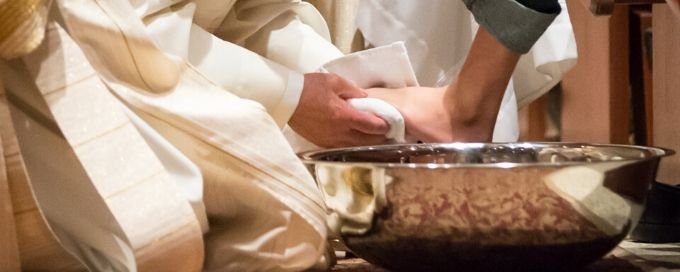We are the body of Christ

Holy Thursday
Exodus 12:1-8, 11-14; Psalm 116 (115): 12-13, 15-18; 1 Corinthians 11:23-26; John 13:1-15
Tonight we read the earliest account of the Last Supper to come down to us from St Paul. The Gospels tell the same story but were written some considerable time after the death of the great apostle. It means that Paul's account is the earliest. This might not seem remarkable to the ordinary reader but it is worthy of note because St Paul is not especially interested in the events of Jesus' life, such as his miracles or his teaching in parables. Instead, Paul is focused almost exclusively on Jesus' death and resurrection, the great events that give us new life in Christ.
So, we can always ask why St Paul goes to the trouble to repeat to the Corinthians the tradition which he himself had received? The reason is simple: the practice of the Eucharist was fractured in Corinth. In those early days, the Lord's Supper was still embedded in a real meal, a supper or dinner. Those who arrived early, probably the well to do, started before everyone was present. When the later comers arrived, probably the less well off, everything was eaten. St Paul observes that “One is hungry and another becomes drunk.” He does on to ask a question that can sound very Irish: “Do you not have houses so that you can eat and drink?” His concern is that that body is Christ is not being recognised — not, as you might think, the sacramental body, but the social body. A few verses on, he gives his assessment: For the one who eats and drinks without careful regard for the body eats and drinks judgment against himself.
A story from the great Brazilian bishop Helder Camara may illustrate the point. In his diocese, a church was broken into, the tabernacle was smashed and the communion hosts were scattered everywhere. People were shocked and they came to Camara to say how horrified they were. The bishop was sympathetic to a point: I understand your reaction to the sacrilege; I would understand it better if you were just as shocked at the abuse of Christ in the exploitation of the poor.
So, we are the body of Christ. Even if we cannot be physically together, in these difficult days, we can be that body nevertheless. Even if we cannot wash each other's feet, we can serve one another in other, equally real ways: by following the guidelines for our health and safety and we can still love one another and be compassion, in a word, we can still recognise the body, of which we are all members without distinction.
A meditation written by Kieran J. O'Mahony OSA of the Irish Province of Augustinians, Co-ordinator of Biblical Studies for the Archdiocese of Dublin

Fr Kieran's website: www.tarsus.ie
Lastest Book: Hearers of the Word. Exploring & Praying the Readings. Let to Pentecost, Year A. To get a copy postfree: www.messenger.ie
Follow the Order of Saint Augustine (O.S.A.), Province of England and Scotland
Thank you! 106 people prayed
Let your speech always be gracious, seasoned with salt, so that you may know how you ought to answer everyone. Col 4:6